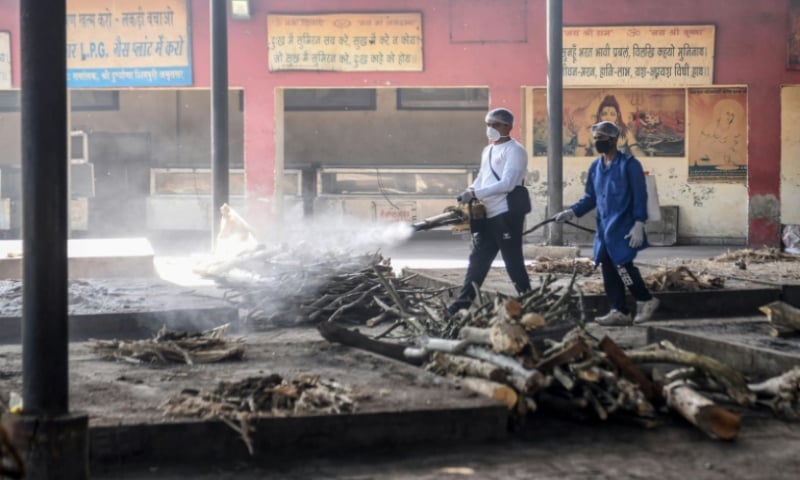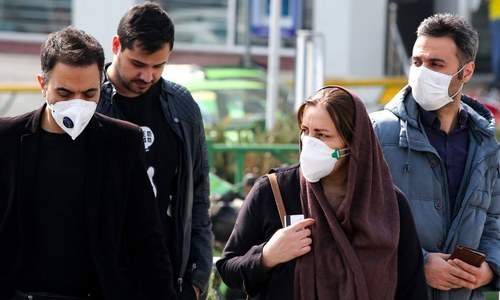South Asia is on course for its worst economic performance in 40 years, with decades of progress in the battle against poverty at risk, because of coronavirus, the World Bank said Sunday.
India, Bangladesh, Pakistan, Afghanistan and other smaller nations, which have 1.8 billion people and some of the planet's most densely populated cities, have so far reported relatively few coronavirus cases but experts fear they could be the next hotspots.
The dire economic effects are already much in evidence, with widespread lockdowns freezing most normal activity, Western factory orders cancelled and vast numbers of poor workers suddenly jobless.
"The immediate challenge for the [Pakistan] government is to contain the spread of the Covid-19 pandemic, while minimising economic losses and protecting the poorest," notes the report in its brief on Pakistan. "In the medium-to-long term, the government should remain focused on implementing much needed structural reforms to boost private investment sustainably."

"South Asia finds itself in a perfect storm of adverse effects. Tourism has dried up, supply chains have been disrupted, demand for garments has collapsed and consumer and investor sentiments have deteriorated," said a World Bank report.
It slashed its growth forecast for the region this year to 1.8-2.8 per cent from its pre-pandemic projection of 6.3pc, with at least half the countries falling into "deep recession".
Worst hit will be the Maldives where the collapse of tourism will result in gross domestic output contracting by as much as 13pc, while Afghanistan could shrink by as much as 5.9pc and Pakistan by up to 2.2pc.

Regional heavyweight India, where the fiscal year began on April 1, will see growth of just 1.5-2.8pc in its current financial year, down from an expected 4.8-5.0pc for the year just ended, the bank predicted.
Inequality
The report also warned that the pandemic will reinforce inequality in the region, with the pandemic hitting informal workers with limited or no access to healthcare or social safety the hardest.
"The poor will be more affected by the crisis. First, they are more likely to become infected by the virus and get ill, as it is more difficult for them to exercise social distancing; they also have more limited access to health care. Second, the loss of work is sudden and large scale. [...] Third, the job losses are not concentrated in the manufacturing companies that produce for export but are widespread in the domestic service sectors, where jobs tend to be paid less and require lower skill levels."
In India for instance, the world's biggest lockdown has prompted hundreds of thousands of migrant workers to return to their home villages, many on foot.
Governments need to "ramp up action to curb the health emergency, protect their people, especially the poorest and most vulnerable, and set the stage now for fast economic recovery", the World Bank said.
In the short term this means preparing weak healthcare systems, providing safety nets and securing access to food, medical supplies and necessities for the most vulnerable, it advised.

It recommended temporary work programmes for migrant workers, debt relief for business and individuals and cutting red tape on imports and exports of essential goods.
And once the crisis is over, governments need urgently to pursue "innovative policies" and jumpstart economies.
"Failure to do so can lead to long-term growth disruptions and reverse hard-won progress in reducing poverty," the bank's Hartwig Schafer said.
The World Bank is taking "broad, fast action", deploying up to $160 billion in financial support over the next 15 months to help countries protect the poor and vulnerable, support businesses, and bolster economic recovery.
Pakistan
In its brief on Pakistan, the report noted: "Pakistan made considerable progress toward macroeconomic stabilisation during the first 8 months of FY20. Measures taken by the authorities helped reduce domestic and external imbalances although at the cost of dampened economic activity. Covid-19 pandemic related disruptions have further strained economic activity.
"Output is expected to contract sharply in Q4-FY20, bringing overall FY20 growth to -1.3 per cent. These developments have put pressure on Pakistan’s fiscal position, as tax collection is being adversely impacted while spending needs are increasing.
"The rapid spread of the Covid-19 virus since February 2020 has brought economic activity to a near halt. Most of the country has been placed under a partial lockdown. The closure of non-essential businesses and domestic supply chain disruptions are having a significant impact on wholesale and retail trade and transport, storage and communication, the largest sub-sectors of the services sector.
"The informal sector and daily wage workers employed in the formal sector are expected to bear most of the costs of expected slowdown in internal demand. The informal sector accounts for 72 percent of employment while informal workers in the formal sector account for another 5 per cent of the total. The expected reduction of employment and incomes in the informal sector will have negative impact on poverty, particularly in urban areas."
Outlook
Real GDP growth is projected to contract by 1.3 per cent in FY20 as domestic and global economic activity slows down sharply in the last four months of the fiscal year, according to the report. "The outbreak of Covid-19 will impact growth beyond FY20. Under the baseline scenario, growth will remain muted at 0.9 per cent in FY21 before reaching 3.2 per cent in FY22.
"Inflation is expected to average 11.8 per cent in FY20 and to gradually decline thereafter. The current account deficit is projected to narrow to 1.9 per cent in FY20, as imports contract more than exports."
"The fiscal deficit is expected to remain elevated, at 9.5 and 8.7 per cent of GDP in FY20 and FY21, respectively. Revenue mobilisation efforts will be negatively impacted by subdued domestic activity, while expenditures will increase to contain the spread of Covid-19 and support the economy.
"The fiscal deficit is expected to fall gradually to 6.0 per cent of GDP by FY22 as the impact of the crisis tapers-off."














































